ISSN: 1705-6411
Volume 10, Number 2 (July 2013)
Author: Dr. Gerry Coulter
I. Introduction
The only truly profound pleasure is keeping on the move (Baudrillard, 1988: 53).
In a discussion of The Songlines with Colin Thubron Chatwin said: “A lot of this is fiction, a lot of this is made up”… but it’s made up in order to make a story real” (in Shakespeare, 1999: 486).

1. Bruce Chatwin. Chairs (n.d.)
Bruce Chatwin was driven to restlessness by a muse who preferred far-away places. Fortunately, like the Pintupi whom he met in Australia, Chatwin valued a good pair of legs for walking above all else (The Songlines: 20). Aside from his talents as a novelist, nowhere more evident than in his On the Black Hill, [within five years of publication a British ‘A-level’ text (Shakespeare, 1999:393)], Chatwin was a most unusual collector of remarkable fragments. He secured his accumulations on the pages of Moleskin notebooks and on photographic film until he was ready to share them with us in his few but precious books1 Most who knew him well, whether or not they admired Bruce in his entirety, found in him an interesting amalgam of charm, seduction, and intellect. His biographer, the thoughtful and empathetic Nicolas Shakespeare, described him as “…everything the English distrust. Stylish. Passionate. A lover of theory and of the French; and obsessive, which we dislike in particular” (1999: 7). Salman Rushie remembers Chatwin for his humour: “one of the funniest two people I have known… you’d be on the floor with pain. When his stories hit their mark they could destroy you” (in Ibid: 9).
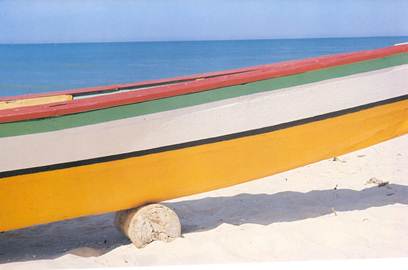
2. Chatwin. Painted Pirogue, Mauritania (c1970)
He was a lover of patina, the well worn kind that improves a surface (in Japan it is referred to as ‘sabi’). He was especially fond of the nicks and dents which were marked both on the faces and souls of the people he met. Chatwin possessed the ability to have people who did not know him well open up to him, revealing parts of their lives often long kept secret.
Chatwin suffered greatly from that most human of maladies – being easily bored – and he quickly grew restless in even the most comfortable places, including his place of work, Sotheby’s:2
My career was the reverse of most people’s in that I started as a rather unpleasant little capitalist in a big business in which I was extremely successful and smarmy, and suddenly I realized at the age of 25 or so that I was hating every minute of it. I had to change (Chatwin to Michael Ignatieff in Shakespeare, 1999: 174).
And so he left to become an archaeologist (entering Edinburgh University) and when that no longer suited him he began his wanders of the farthest reaches of the earth beginning in Patagonia. Horizons attracted Chatwin who innately sensed that what lies beyond the horizon of appearances is the horizon of disappearance: So next day, as we drove through the desert, I sleepily watched the rags of silver cloud spinning across the sky, and the sea of grey-green thorn-scrub lying off in sweeps and rising in terraces and the white dust streaming off the saltpans, and, on the horizon, land and sky dissolving into an absence of colour (Chatwin, In Patagonia: 17).
On his travels Chatwin met, and perhaps somewhat invented,3 very interesting characters. His singular eye for fragments also enabled him to collect a series of remarkable photographic images (Chatwin appears to have thought in images once describing himself as a writer as a sort of literary Cartier-Bresson: “‘the decisive moment’, an instant when everything in the picture is in balance. Bruce sought the same reverberating image” Shakespeare, 1999: 292 ).4 The writings which derive from his travels (with generous philosophical insights concerning the nature of humanity and existence woven into them), began in 1977, and ended in 1988. In his forty-eight years he saw more of the world, while developing his own singular perspective on it, than many other travelers who live to be nearly twice his age. Many of his photographs are either of doors and windows or taken though doors and windows. He was never fixed it seems, with at least one eye always looking for his next exit.
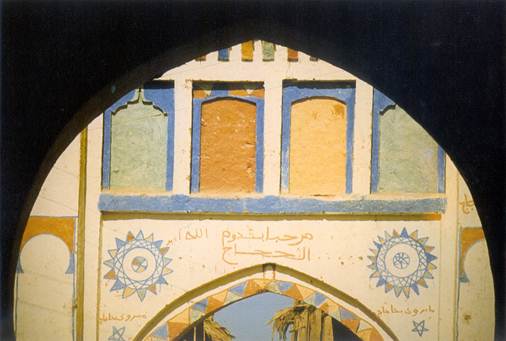
3. Chatwin. Painted Courtyard, Tunisia (n.d.).
Despite his immense talents as an observer and writer, I wonder if Chatwin’s writing, and his photography, is as well known as they might be today as we approach a quarter century after his death. This essay shares, with an audience interested in things ‘Baudrillard’, some of Chatwin’s literary and photographic fragments. We are, Baudrillard (1993a) tells us, the people who “banished elsewhere”. Chatwin, easily annoyed with globalizing sameness, set out to retrieve what we have attempted to drive out. He did so in the fullness of his engaging images, both written and photographic.
Those who love Baudrillard often do so, it seems, almost as much for how he wrote as for what he wrote. Chatwin (like Italo Calvino to whom Roberto Calasso compares him, in Shakespeare, 1999: 306), is also such a writer. His style is almost unique – characters (but usually no central ones) appear and disappear in collections of cameos and fragments which are assembled into a rather cubist form. Yet, his prose is lovely, somewhat antiquated but never overwrought, and almost always interesting. Chatwin is always on the verge of mirth as he teases us hovering as he does between fact and fiction (Shakespeare, 1999: 308). In Patagonia, his first book, won the Hawthornden Prize for imaginative literature in the UK, was judged book of the year by both The Times and The Sunday Times, won praise from the New York Review of Books, and the New Yorker, was judged book of the year by the staff of the New York Times Book Review and won the E.M. Forster award in New York in 1979 (see Shakespeare, 1999: 352 ff.). Sales of In Patagonia led to Chatwin selling the German and American rights, allowing him to continue his travel and writing (Shakespeare, 1999: 352).5 Graham Greene was among Chatwin’s earliest admirers as was Jean Raspail in France. On In Patagonia, the erudite and already widely read Edward Lucie-Smith said: “I was quite frankly jealous… why can’t I write like that” (in Shakespeare, 1999: 310). Chatwin had his own manner as a writer which was a combination of colourful and serious.
It is my hope that this essay will alert those who have missed Chatwin to one of the more interesting writers and attractive literary figures, of the twentieth century. Chatwin’s books are the result of a world he walked into existence – for him our real home is not a house, it is the road (“Home is a perversion”, Chatwin: Notebooks, in Shakespeare, 1999: 233).
II. The Perceptive Nomad
Solvitur ambulando. ‘It is solved by walking’ (The Songlines: 171).
He had a bad case of what Baudelaire called ‘The Great Malady: Horror of One’s home’ (In Patagonia: 87).
Chatwin believed that the original state of humanity was nomadism. “The Golden Age” of humanity had “ended when men stopped hunting, settled in houses and began the daily grind” (In Patagonia: 136). He agreed with the fourteenth century Arab historiographer Ib’n Khaldūn’s assessment: “that men decline, morally and physically, as they drifted toward cities. The rigors of the desert … preceded the softness of cities. The desert was a reservoir of civilization, and the desert peoples had the advantage over settlers because they were more abstemious, freer, healthier, less bloated, less craven, less liable to submit to rotten laws…” (The Songlines: 196).
For the final two decades of his life Chatwin kept on the move most of the time. His searches took him across oceans, deserts, and through many and varied lands, like something pathologically on the move. Among the things we gain from Chatwin is a particular take on diverse people and places that have since, in many cases, disappeared. He read widely in anthropology which fueled his insights concerning our migratory nature:
The Norwegian anthropologist Frederick Barth, writes of how the Basseri, another tribe of the Iranian nomads, were, in the 1930s, forbidden by Reza Shah to move from their winter grazing ground. In 1941 the shah was deposed, and they were free once again to make the 300-mile journey to the Zagros. Free they were, but they had no animals. Their fine-fleeced sheep had suffocated on the southern plains: yet they set off all the same. They became nomads again. ‘The supreme value to them’, wrote Barth, ‘lay in the freedom to migrate, not in the circumstances that make it economically viable.’ When Barth came to account for the dearth of ritual among the Basseri – or any rooted belief – he concluded that the Journey itself was the ritual, that the road to summer uplands was the Way, and that the pitching and dismantling of tents were prayers more meaningful than any in the mosque (The Songlines: 200).
Among the people he met on his travels Chatwin recorded a conversation with a man from Senegal which, like many conversational fragments he collected, show Chatwin’s love of the extraordinary and unexpected:
There were about fifty people on top of the truck, huddled against sacks of grain. We were half-way to Atar [Mauritania] when a sandstorm hit. Next to me was a strong smelling Senegalese. He said he was twenty-five. He was stocky and over muscled, and his teeth were orange from chewing cola nuts.
‘You are going to Atar?’ he asked.
‘You too?’
‘No, I am going to France.’
‘What for?’
‘To continue my profession.’
‘What is your profession.’
‘Installation sanitaire.’
‘You have a passport?’
‘No,’ he grinned, ‘I have a paper.’
He unfolded a soggy scrap of paper on which I read that Don Hernando so-and-so, master of the trawler such-and-such, had employed Amadou… surname blank … etc. etc.
‘I will go to Villa Cisneros’ he said. ‘I will take a ship to Tenerife or Las Palmas in the Gran Canaria. There I will continue my profession.
‘As a sailor?’
‘No monsieur. As an adventurer. I wish to see all the peoples and all the countries of the world’ (The Songlines: 172).
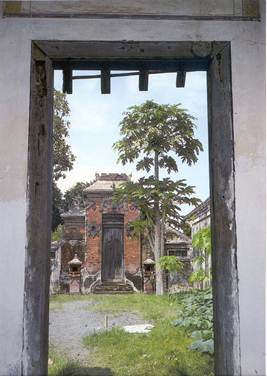
4. Chatwin. Temple in Bali (n.d.)
Chatwin’s travels took him to places where many people would not feel safe. He was a firm believer however in Holderlin’s notion” “where there is danger there grows also what saves” (Hölderlin, Patmos, in The Songlines: 235). No risk, no reward – and the rewards of Chatwin’s travels and his reading could be astonishing as when he provided us pause to rethink the origins of capitalism and of Max Weber’s famous thesis:
Weber traces the origins of modern capitalism to certain Calvinists who, disregarding the parable of the camel and the eye of the needle, preached the doctrine of the just rewards of work. Yet the concept of shifting and increasing one’s ‘wealth on the hoof’ has a history as old as herding itself. Domesticated animals are ‘currency’, ‘things that run’, from the French courir. In fact, almost all our monetary expressions – capital, stock, pecuniary, chattel, sterling – perhaps even the idea of ‘growth’ itself – have their origins in the pastoral world (The Songlines: 185)
At several points in his writing Chatwin turns to infants to support the notion that we are born to keep on the move. These two adjoining fragments point to what babies tell us about our past:
That man is a migratory species is, in my opinion, born out by an experiment made at the Tavistock clinic in London and described by Dr. John Bowlby in his Attachment and Loss. Every normal baby will scream if left alone; and the best way of silencing these screams is for the mother to take it in her arms and rock or ‘walk’ it back to contentment. Bowlby rigged up a machine which imitated, exactly, the pace and action of a mother’s walk; and found that, providing the baby was healthy, warm and well-fed, it stopped crying at once. ‘The ideal movement,’ he wrote, ‘is a vertical one with a traverse of three inches.’ Rocking at slow speeds, such as thirty cycles a minute, had no effect: but once you raised the pace to fifty and above, every baby ceased to cry and almost always stayed quiet.
Day in, day out, a baby cannot have enough walking. And if babies instinctively demand to be walked, the mother, on the African Savannah, must have been walking too; from camp to camp on her daily foraging round, to the waterhole and on visits to the neighbors (The Songlines: 227).
Chatwin was greatly given to such poetic solutions to the many riddles of human existence.
III. The Collector of Extraordinary Fragments
In a paperback copy of Tristan Shandy bought in the second hand bookstore in Alice, this was scribbled in the fly-leaf: ‘One of the few moments of happiness a man knows in Australia is the moment of meeting the eyes of another man over the top of two beer glasses” (The Songlines: 175).
Chatwin had a knack for finding people and things, and then discovering links to other related things. In Patagonia he found a century old cabin built by an American in Chabut Province (near Cholila) in 1902. After speaking with a local woman Chatwin discovered the identity of its notorious owner and from there went on to quote from a letter the man had written home to America from this cabin:
Mrs. Davies
Ashley, UtahMy Dear Friend, …It will probably surprise you to hear from me away down in this country but the U.S. was too small for me the last two years I was there. …I have 300 cattle, 1500 sheep, and 28 good saddle horses, 2 men to do my work, also a good four room house, warehouse, stable, chicken house and some chickens. The only thing lacking is a cook, for I am living in single Cussideness and sometimes I feel very lonely for I am alone all day, and my neighbors don’t amount to anything (In Patagonia: 43-44).
The letter was signed Robert Leroy Parker who was then at the top of the Pinkerton Agency’s list of most wanted criminals under the name: “Butch Cassidy”.
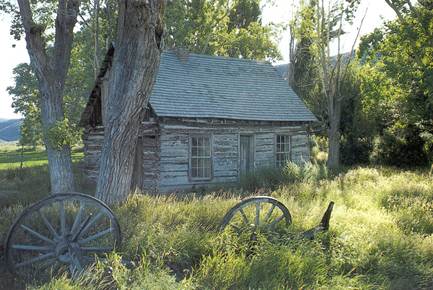
5. Chatwin. Butch Cassidy’s Four Room Log Cabin near Cholila, Patagonia.
Chatwin is among few remarkable writers seeking out the margins before they came to the centre. Indeed, it was he as much as anyone from the centre, who made us, in the West, aware that there were “margins”.
Chatwin held a place in his heart for people running out of options. He shares two of them he found in Patagonia – the first a hitch-hiker:
At the foot of a telegraph pole we saw a single standing figure. He had blonde hair and was travelling south. …He was a miner, he said. He was looking for work in a mine. He had torn a page from an old copy of the National Encyclopaedia. The page had a map showing various mines in Argentina. There was a gold mine at Rio Pico.
He had been one of the original Flower Children in the Haight-Ashbury district of San Francisco…. There was something elemental, he said, about mining. Mines gave him a feeling of security. Working in a mine in Arizona he had himself a house and a fine living wage, that is, until they came after him for taxes. Those darn taxes, and he’d said: ‘I’m through. I’m goin down to South America, to find myself another mine.’
We helped the driver change a wheel and he stood us drinks at Gobernador Costa. I asked a Welsh shopkeeper about the mine in Rio Pico. He said it had closed fifty years back. The nearest was a kaolin mine at Apeleg.
‘What’s kaolin?’
‘White china clay.’…
‘Where’s Apeleg?’
‘A hundred kilometers south,’ the Welshman said. ‘After that there’s the coal mine at Rio Turbio, but it’s soft coal and you wouldn’t want to work there’.The miner had no money and his passport was stolen. He had dinner on me. In the morning he said he’d be heading on south (In Patagonia: 54).
A few days later Chatwin met a farmer at a Scottish sheep station, not far from Rio Pico:
The Scotsman had lived forty years in the valley. He had the reputation of being very tight fisted. One year, when the price of wool was up, he and his wife went to Scotland. They stayed in first class hotels and were a week on Lewis. There he became familiar of the things his mother spoke of – gulls, herring boats, heather, peat – and he had felt the call. Now he wanted to leave Patagonia and retire to Lewis. … He did not know how to get out. The price of wool was falling and the Perónistas were after the land. Next morning we stood outside the house and looked along the line of telegraph poles, watching for the shearer’s truck. In place of a lawn was a flat expanse of packed dirt, and in the middle, a wire-netting cage.
‘And what do you keep in there?’ I asked.
‘Argh! The bugger died on me.’
Curled in the bottom of the cage lay the dried skeleton of a thistle (In Patagonia: 67).
Chatwin’s prose is the result of his love of the weaving of found fragments. With the exception of On the Black Hill and Utz, his books are full of fragments, as Shakespeare so eloquently expresses it: “all shattered and brought back together” (1999: 307).
IV. Joy in Alterity
I’m not interested in the traveler… I’m interested in what the traveler sees (Chatwin to ABC Radio in Shakespeare, 1999: 292).
So few remain today – the last nomads. We look out from our prisons of culture at them and occasionally pass close to them if we journey far enough. I think the reason Chatwin never finished his great work on nomads [it was eventually folded into The Songlines] is that he did not travel with them. Instead he was a nomad himself quickly tiring of one culture after the one before. He understood that permanent settlement was our “Fall” and he read the story of Adam and Eve (Genesis 3:19) as one more version of the end of nomadism. Life in towns and cities has been the punishment endured by most of our kind ever since. Chatwin traveled enough to know that globalism was toxic and he certainly suspected it would not win out in the end. He understood and valued radical otherness. He deeply admired odd and rural characters of whom he said, referring to Jean in On the Black Hill: “The twentieth century has continued to wash over and not pulverize her” (Shakespeare, 1999: 396). One of my favourite accounts of radical alterity in Chatwin appears in The Songlines (188) when Chatwin recounts his meeting with a holy-man who has stopped his prayers in a mosque to speak to this European who has wandered in:
“There is a people called the Mericans?” he asked.
“There is”.
“They say they have visited the Moon”.
“They have.”
“They are blasphemers”.
Bruce accepts the radical alterity of cultures, he had read Segalen, and he had travelled enough to respect the ways in which other peoples did things or loved the things they loved. He was witness, in Mauritania, to the end of nomad life, it was part of his extraordinary gift for simply being there to observe:
A scatter of buildings dumped down in the sand and now surrounded by a bidonville of nomads, who, like Jacob and his sons, have been forced into settlement ‘when famine was sore in the land’.
The Moors have a passion for the colour blue. Their robes are blue. Their turbans are blue. The tents of the bidonville are patched with blue cotton; and the shanties, cobbled together from packing crates, are bound to have some blue paint somewhere.
This afternoon I followed a wizened old crone who was picking over the garbage dump in search of a blue rag. She picked up one piece. She picked up another. She compared them. She chucked the first piece away. At last she found a shade which was exactly the shade she was looking for – and she went away singing (The Songlines: 172).
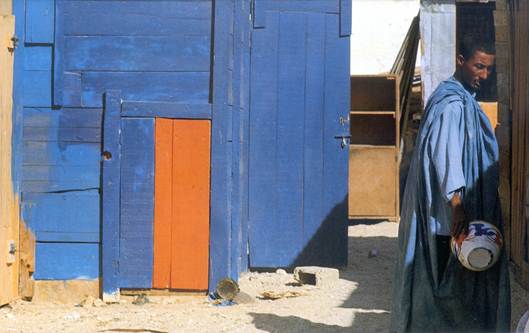
6. Chatwin. A Moor in Mauritania (1970)
The woman searching for just the right fragment is not unlike Chatwin’s at work sifting through fragments of people’s lives which became the very substance of most of his books.
Chatwin tended to like people but was always wary of human weakness. Those who disliked Chatwin were more likely to do so after the fact, after having read what he had written about them (see Shakespeare on the Welsh of Patagonia, for example, 1999:313 ff.). Many who met Chatwin on his travels very much liked him. Two instances of many suffice to demonstrate this. The first involves his meeting with an unreserved child in Mauritania:
On the edge of town three tiny boys stopped booting their football and ran up to me. Instead of asking for money or my address, the tiniest began a very grave conversation. What was my opinion of the war in Biafra? What were the causes of the Arab-Jewish conflict? What did I think of the persecution of the Jews by Hitler?…
‘But who’, I asked, ‘are you?’
He saluted stiffly. ‘Sall, Zackaria sall Muhammed… Son of the Minister of the Interior’.
‘And how old are you?’
‘Eight’.
Next morning a jeep arrived to take me to the Minister.
‘I believe, cher Monsieur, that you have met my son. A most interesting conversation, he tells me. I, for my part, would like you to dine with us, and to know if I can assist you in any way’ (The Songlines: 172).
It seems that fairly early on Chatwin had discovered a truth about writers and hospitality that his friend Gregor von Rezzori would pronounce of him many years later: “He would pay with anecdotes and by being there. He was a born guest, as writers should be” (in Shakespeare, 1999:391).
Similarly, when travelling in Patagonia, Bruce had stayed in a simple hotel owned by a family who were not wealthy. When it was time to leave, the family who had enjoyed Bruce’s company, attempted not to charge him. Chatwin recounts his settling of the bill:
In the morning I had a tremendous row about the bill.
‘How much was the room?’
‘Nothing, if you hadn’t slept in it, nobody else would.’
‘How much was dinner?’
‘Nothing, how could we know you were coming? We cooked for ourselves.’
‘Then how much was the wine?’
‘We always give wine to visitors.’
‘What about the maté’
‘Nobody pays for maté.’
‘What can I pay for then, there’s only the bread and the coffee left.’
‘I can’t charge you for bread, but café au lait is a gringo drink and I shall make you pay.’ (In Patagonia: 55).
“Never be a gringo!” (Baudrillard).
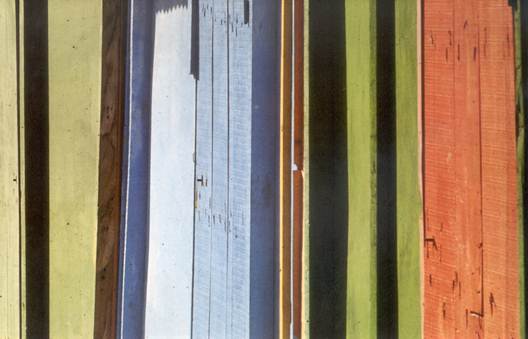
7. Chatwin. Side of a wooden shack, Nouakchott, Mauritania (c1970)
Chatwin’s experience of alterity was not always physically pleasing, indeed sometimes it was frightening (he was small and not at all intimidating), yet somehow pleasing to the intellect. A series of fragments from his Mauritania notebooks – the trip which eventually led him to Dahomey (now Benin) and the subject of his novel The Viceroy of Ouidah – tell us much about the honest and tired traveler who wrote them:
2 January, 1971 Sahel Hotel, Niger:
The usual horror of air travel. Packaged and process on a death cart, let down at an African airport that one might mistake for the moon, swindled by the taxi-driver and porter, and installed in one of those anonymous hotels… Don’t admire this culture very much. Pure asceticism of the desert appeals to my arid sense far more… The French always exported the very worst of their culture to the colonies… A man in a blue boubou balancing a hundredweight sack on his head crouching to urinate… The American party at the next table. He announced himself very grandly as the Deputy Director of the Peace Corps. … Both women are tough and pointless, the men are ineffectual. Very straight and square and they want to know Vice-President Agnew and help the blacks.7 January:
Elegance of the Moors. Clean ascetic quality of Islam. The smell of course is less than anything one might expect on a European bus… The advertisement for Bière Nigerienne carries a photo of a blonde… Voyages bring out the best in people … this voyage brought out the worst in me. …I happen to like lands that are sucked dry. They suit me. We compliment each other. …President Pompidou will leave today on his round to shore up the mineral reserves of France. Niger is the world’s third largest exporter of uranium. 10 percent for Niger, 80 percent for France.10 January, Dahomey:
This country, about which I know absolutely nothing – will forever remain fixed in my mind as the land of the decent train. …Have made a bad start with the Hotel de Port, imagining some sort of old-style joint where the poor whites congregate for a Ricard and whore. Instead the most elaborate motel with piscine and thatched beach cottages. The outside looked not unpromising but concealed the deadly Tropical-Americanization of the interior (Chatwin, Notebooks, 1993: 66-75)
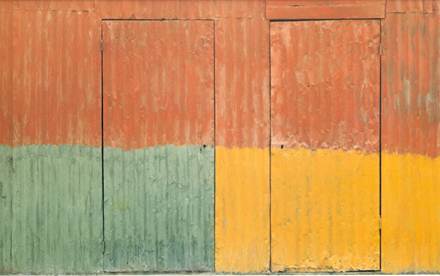
8. Chatwin. Painted storefront, Mauritania (c1970)
From his travels we have notes, novels, collections of written fragments, and photographs. His photography was of a different kind than most of its time as he preferred the abstraction of the everyday – in bright sunlight – to accentuate the vivid colour and shadows. Many of the characters he meets are presented to us in literary vivid colour. Among my favourites is Chatwin’s record of a brief encounter with a man named Stumpy Jones on his travels through the Australian outback with Arkady, a survey engineer with the railroad:
Around noon we sighted Stumpy Jones’s truck. He was coming back from Cullen, from delivering the weekly supplies. He braked and leaned out of his cab. ‘Hi Ark’ he called:
‘Want a shot of Scotch?’
‘Wouldn’t say no.’
He handed down the bottle. We each took a couple of swigs and handed it back. …Stumpy Jones was a grizzled, green-eyed man with enormous biceps and a ‘bit of the black in him’. He was wearing a red plaid shirt. The left half of his face was yellowish scar tissue. On the trailer he was carrying a caravan which was being sent for modernization in Alice. … ‘What happened to his face?’ I asked. ‘Bitten by a king-brown,’ said Arkady. ‘About four years back he got down to change a wheel and the bugger’d wrapped himself around the axle. He got over that one and the thing went cancerous.’ ‘Christ!’ I said. ‘Stumpy’s indestructible.’ (The Songlines: 144-45)
Other meetings were full of poignant pathos such as their lunch with an old man who was resolved to his fate but did not want to die alone in the outback (just before this passage Chatwin has declined the offer of a place to write if he wished to stay. The old man (Hanlon) was angry at the rejection:
I hung about the yard for a while and when I went in the steaks were done. Hanlon had fried six eggs and was ready to carve. ‘Serve His Lordship first!’ he said to Arkady. …It was unbearably hot, I looked at the steak and the egg yolks. Hanlon looked at me for what seemed a full minute and said, ‘Get your fucking fangs into that steak!’
We ate without speaking.
Hanlon steadied his steak with his withered hand, and cut it into cubes with the good one. His knife had a serrated blade and a pair of curled up prongs on the end of it.
‘Who the hell does he think he is?’ he turned to Arkady. ‘Who asked him to poke his upper-snotty-class nose in here?’
‘You did,’ said Arkady.
‘Did I, well I made a mistake.’
‘I’m not upper class,’ I said.
‘But a touch too classy for my little luncheon party!
Luncheon! That’s what they call it in Pongleterre! Luncheon with the Queen! What?’
‘Cut it out Jim,’ Arkady said. He was very embarrassed.
‘none of it meant personally,’ said Hanlon.
‘That’s something,’ I said.
‘It is,’ he agreed.
…
No one spoke until Hanlon burped and said ‘Beg pardon!’
‘Can’t eat the bugger,’ he said.
‘Anything the matter?’ said Arkady.
‘I got a crook gut,’ Ark.
‘You should go to a doctor.’
‘I’ve been to the doctor. They want to cut me up, Ark.’
‘I’m sorry,’ I said.
‘I won’t let them cut me, that’s right isn’t it?’
‘No,’ said Arkady. ‘Maybe you should go.’
‘Well, maybe I will,’ he sniffed miserably.
At the end of another five minutes Arkady got up and laid his arm protectively around the old man’s shoulders.
‘Jim,’ he said in a soft voice, ‘I’m sorry, I’m afraid we’ve got to go. Can we take you anywhere?’
‘No,’ he said. ‘I’ll stay.’
We made a move to go.
‘Stay a bit longer,’ Hanlon said.
‘No, really, we have to go.’
…
‘Sorry I flew at you,’ he said to me. His lip was quivering.
‘Always fly at Poms!’
‘No worries,’ I said.
…
He looked scared. His cheeks were wet with tears. He turned his back. He could not bear to watch us going. (The Songlines: 83-85).
Hanlon’s story reminds us that the Moorish proverb (which Chatwin quotes later) is a two sided one: “he who does not travel does not know the value of men” (Ibid.: 164).
Sometimes Chatwin’s notes are fascinating fragments which run from the provocative to the prophetic as in those taken in Afghanistan (the week when Neil Armstrong’s walked on the moon). Here are the notes of a literary craftsman with an eye for detail:
Kandahar, July 19, 1969:
Here’s a real hell hole! This place is the end of the bloody world… The Kandaharis either have the wild eye of the fanatic or the stupification of hashishism. … Every second young man in his twenties seems to be a dealer. This is a place with its culture in decline. …There comes a point when aggressive masculinity becomes a bore. One longs for the female. Longs for a breast visible in public. …The mountains are laid out in diagonal strata like Leonardo. …A camel caravan… brilliantly covered saddlebags… osmotic fluency of a camel’s walk. …The airline officials swear in American English. They have lost their own swear words.Herat, 13 August:
The indescribable filth of the Bahzad hotel… three fridges, all Russian, one called the Moskva, all roaring away. … the third has gone sadly wrong, it heats and doesn’t cool. A file of ants leads from the garden doorway over the red carpet into the warm fridge (Chatwin, Notebooks, 1993: 122-133).
Chatwin takes us across space, through time, and into the soul of people he met. In his novels he has the remarkable ability to write from the point of view of characters very different from himself. Among his best literary characters is Mary a woman in On The Black Hill:
The winter was hard. From January to March the snow never melted off the hill and the frozen leaves of foxgloves drooped like dead donkey’s ears. Every morning she peered from the bedroom window to see if the larches were black or crisped with rime. The animals were silent in the deep cold, and the chatter of her sewing machine could be heard as far as the lambing paddock. …
The crisis came when she experimented with a mild Indian curry. He took one mouthful and spat it out. ‘I want none of your filthy Indian food,’ he snarled, and smashed the serving dish on the floor. She did not pick up the bits. She ran upstairs and buried her face in the pillow. He did not join her. He did not, in the morning, make amends. He took to sleeping rough and went for long walks at night with a bottle in his pocket. One wet night, he came home drunk and sat staring savagely at the tablecloth, clenching and unclenching his fists. Then he got to his feet and lurched towards her. She cringed and raised her elbow. ‘Don’t hit me,’ she cried. ‘I won’t hit you, he roared, and rushed out into the dark.
At the end of April there were pink buds in the orchard, and a visor of cloud above the mountain. Mary shivered by the gate and listened to the tireless lapping of the rain. The house absorbed the damp like a sponge. Mouldy rings disfigured the whitewash, and the wallpaper bulged.
There were days when it occurred to her that she had sat for years in the same damp, dark room, living with the same bad-tempered man. She looked at her chapped and blistered hands, and felt she would old and coarse and ugly before her time. …she began to identify herself with the one, wind-battered thorn-bush that she could see from the window, silhouetted on the lip of the escarpment (On the Black Hill: 31, 35-36).
On the Black Hill, like In Patagonia, received excellent reviews and was a literary success beyond what Chatwin had expected (it won the Whitbread Prize for ‘first novel’ in 1982). It was a book in which he showed himself to be a highly adept traveler across more than political boundaries as he traversed a century of time, a rural culture now mostly gone, and sex in writing the female characters.
V. Conclusion
The song still remains which names the land over which it sings (Martin Heidegger, What Are Poets For? In The Songlines: 279).
The ‘Songlines’ are a feature of the spirit world of the Aboriginals of Australia. Indeed, they voice the founding moment of the world in the song’s of ancestors. Chatwin related the story of the Songlines as it was passed on to him from an ex-Benedictine priest, ‘Father Flynn’ (Pat Dobson in real life, Shakespeare, 1999:418): White men, made the common mistake of assuming that, because the Aboriginals were wanderers, they could have no system of land tenure. This was nonsense. Aboriginals, it was true, could not imagine territory as a block of land hemmed in by frontiers: but rather as an interlocking network of ‘lines’ or ‘ways through’. ‘All our words for “country”’, he said, ‘are the same as the words for “line”’.
Before the whites came, he went on, no one in Australia was landless, since everyone inherited, as his or her private property, a stretch of the Ancestors song and the stretch of country over which he passed. A man’s verses were his title deeds to territory. He could lend them to others. He could borrow other verses in return. The one thing he couldn’t do was sell or get rid of them.
Suppose you took an area like that of the Central Aranda? Suppose there were six-hundred Dreamings weaving in and out of it? That would mean twelve-hundred ‘handover points’ [stops] dotted around the perimeter. Each ‘stop’ had been sung into position by a Dreamtime Ancestor: its place on the song-map was unchangeable. But since each was the work of a different ancestor, there was no way of linking them sideways to form a modern political frontier (The Songlines: 56-57, 59).
Bruce Chatwin was a latter day nomad who loved the bitter and the sweet poetry of the fragments of the world and as he journeyed the earth his writing sang new world’s into existence for us. In his Pensées Pascal, so Chatwin reminds us, noted that all of man’s miseries can be traced to the great difficulty we have remaining quietly in a room (in The Songlines: 161). For some, like Chatwin, the need to remain on the move, yields wonderful stories. Occasionally, he stopped for a photograph. For both his written and photographic images we are in his debt.
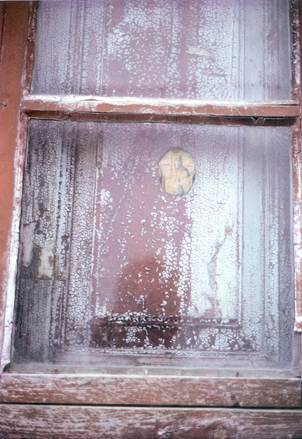
9. Chatwin. Holy Virgin (window) (n.d.)
An important part of Chatwin’s quest was to uncover and present some important mythic dimension of humanity. His incessant gathering of fragments, such as this passage from J. G. Herman’s Aesthetica in Nuce, gives us an idea of what he was after: “Poetry is the mother tongue of the human race as the garden is older than the field, painting than writing, singing than declaiming, parables than references, bartering than commerce (in The Songlines: 269).Chatwin once observed that the Bushmen of the Kalahari do not believe in an immortal soul. “When we die, we die… the wind blows away our footprints, that is the end of us” (in The Songlines: 228). Unlike the traditional Bushmen, Chatwin was not only an endless walker, but a writer. I hope it will take the wind a good long time to blow away his words and images which appear today in over thirty languages.
VI. Epilogue
We are what others have made us (Chatwin, The Songlines).
…to pass off fiction as reality, or to inject fiction into reality, is one of the most demanding and imperishable of human experiences – and the dearest ambition of any storyteller (Mario Vargas Llosa, cited by Shakespeare, 1999:491).
He was a traveler whose journeys were devoted to a Muse who allowed Chatwin to earn a discriminating readership. He could be, by many accounts, a difficult person and he was selfish (sometimes perhaps even more than an artist has a right to be). It is worth remembering that Chatwin paid the price of his selfishness and his dedication to his art – loneliness. His wife Elizabeth cut a rather heroic figure in her dedication to him and his long absences. She had to kick him out once but took him back and stuck with him through thick and thin to the very end. His death was due to complications resulting from AIDS.
In a letter to Keith Milow Chatwin wrote: “The function of the artist is to work (a) for himself (b) to leave something memorable for the future, to shore up the ruins. Fuck the rest of them!” (in Shakespeare, 1999:310). If young authors take anything from Chatwin I hope it is his sense of independence, his sense of what it means to tell a story beyond the limits of the expectations of others – especially the expectation that one’s writing labour under the burden of a politics. The thing it appears he loved the most was a good story and learning to tell a good story in his writing. As Hans Magnus Enzensberger said it so well: “… it is surely as a storyteller that Chatwin will be remembered, and missed – a storyteller going far beyond the conventional limits of fiction, and assimilating in his tales elements of reportage, autobiography, ethnology, the Continental tradition of the essay, and gossip” (cited in Shakespeare, 1999:540).
He was twice subject to deeply unfair criticism. The first occasion was upon the publication of The Songlines when academics leapt on Chatwin for speaking about sacred traditions of the aboriginals. He was criticized for making things up and for his interpretations. As in several of his works he was criticized for a lack of truth. But when do we, as academics or otherwise, turn to a novelist for the Truth? By the 1980s we were far enough into poststructuralism to know we would not find truth in academic texts either. In any event it is exceedingly stupid to pick up a novel looking for anything more than the author’s truth. The Songlines are Chatwin’s effort to understand something of aboriginal culture (and of Australia more generally) while coming to grips with his nomad thesis – the book is a wonderful amalgam of all of these. He certainly did not expect The Songlines to become a textbook in ethnology classrooms. What Chatwin had was the courage to face up to the most inexplicable thing he had ever met and to express it in his own words (see Shakespeare, 1999:422). What else can a great writer do? Indeed, the poststructuralist Baudrillard challenged Chatwin to see the devilish artistry of the storyteller in the Songlines themselves:
The strangest feeling one is left with after reading Bruce Chatwin’s Songlines is a lingering perplexity about the reality of the ‘lines’ themselves: do these people and musical itineraries, these songs, this ‘dreamtime’, really exist or not? In all these accounts there is a hint of mystification; a kind of mythical optical illusion seems to be operating. It is a though the Aboriginals were fobbing us off. While unveiling the profoundest and most authentic of truths (the Austral myth at its most mysterious), they also play up the modern and hypothetical of considerations: in irresolvability of any narrative, absolute doubt as to the origins. For us to believe these fabulous things, we need to feel that they themselves believe them. But these Aboriginals seem to take a mischievous pleasure in being allusive and evasive. They give us clues, but never tell us the rules of the game, and one cannot help getting the impressions that they are improvising, pandering to our phantasies, but withholding any reassurance that what they are telling us is true. This is doubtless their way of keeping their secrets while at the same time poking fun at us – for in the end we are the only people who want to believe these tales (Baudrillard, 1993a:137).
Chatwin was also attacked by some for not going public with his illness and making his death into a political event. He was said to be “irresponsible” in choosing to die a quiet death (see Shakespeare, 1999: 499 ff.). Chatwin was never a political actor, he understood that it would ruin his life, his writing, and possibly his hard won readership. He had an innate awareness that the terrorism of the social works on the individual through politics. A political Chatwin would have not been worth reading. To expect Chatwin to become in death, someone he never was in life, was a foolish expectation and an embarrassing criticism on those who made it.
In our time, when one’s class or taste automatically makes one suspect to the braying herds of sociologists, who respond to the exceptional with dim-witted scornfulness and self-indulgent accusations of “irresponsibility”, Chatwin’s memory may take pride in having been attacked by the voices of mediocrity. To presume how to tell a writer to write, or what to write, is to peer over the abyss of censorship – worse, of the state socialist dreams of the architects of nightmares. To presume to tell a dying man how to die is callow and thoughtless. For Chatwin’s part he seems to have discovered early on how best to enjoy the journey:
I come from a very middle-class family of lawyers and architects. Travel was an immense relief – it got rid of the pressure from above and from below. If you’re out on the road people have to take you at face value (to Michael Ignatieff, in Shakespeare, 1999:145).
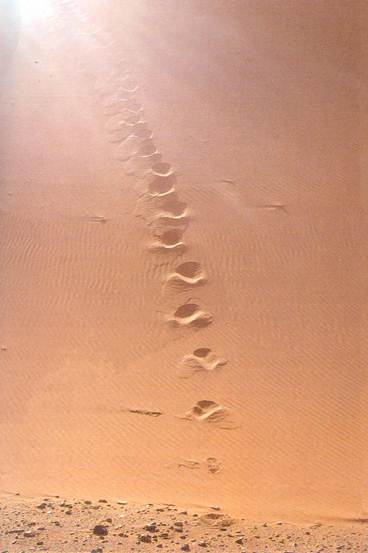
10. Chatwin. Footprints in the Sand (n.d.)
About the Author
Dr. Gerry Coulter is from Bishop’s University, Sherbrooke, Quebec, Canada
References
Jean Baudrillard (1988). America. New York: Verso.
Jean Baudrillard (1993a). The Transparency of Evil. New York: Verso.
Bruce Chatwin (1977). In Patagonia. London: Jonathan Cape.
Bruce Chatwin (1980). The Viceroy of Ouidah. London: Jonathan Cape.
Bruce Chatwin (1982). On the Black Hill. London: Jonathan Cape.
Bruce Chatwin (1987). The Songlines. New York: Viking Press.
Bruce Chatwin (1988). What Am I Doing Here? London: Jonathan Cape.
Bruce Chatwin (1993). Photographs and Notebooks. London: Jonathan Cape.
Bruce Chatwin (1997). Anatomy of Restlessness: Uncollected Writings. Edited by Jan Borm and Matthew Graves. London: Jonathan Cape.
Bruce Chatwin (1998). Winding Paths: Photographs by Bruce Chatwin. London: Jonathan Cape.
Elizabeth Chatwin and Nicolas Shakespeare (2011, Editors). Under the Sun: The Letters of Bruce Chatwin. London: Vintage Books
Blaise Pascal (1670). Pensées. Available on-line: http://www.ccel.org/ccel/pascal/pensees.toc.html
Nicholas Shakespeare (1999). Bruce Chatwin. London: Vintage.
Endnotes
1 – His books are: In Patagonia (1977), The Viceroy of Ouidah (1980), On the Black Hill (1982), The Songlines (1987), Utz (1988), What Am I doing Here (1988), Photographs and Notebooks (1993), and Patagonia Revisited (with Paul Theroux, 1986). Chatwin is remembered by Theroux in Chatwin Revisted (1993). A collection of his shorter works appeared posthumously as Anatomy of Restlessness (Jonathan Cape, 1996). A collection of his photographs appeared under the title Winding Paths (Jonathan Cape, 1998).
2 – Chatwin had worked at Sotheby’s in London doing well because he had the “eye” for art and antiquities. While not well educated in art – he knew how to read an artist’s style (like personal letters), such as the day he spotted two fake paintings under the name of Jackson Pollock heading to market. After Sotheby’s he did work abroad, on the sly, for rival Christie’s (Shakespeare, 1999:223).
3 – Chatwin told Michael Ignatieff: “I once made the experiment of counting up the lies in the book I wrote about Patagonia… it wasn’t in fact, too bad: there weren’t too many (Shakespeare, 1999:313). “He could enlarge and colour and improve his stories, but he could not make them up from scratch (in Ibid.:361).
4 – Shakespeare tells us that Bruce’s photographic eye was noticed by others. When David Sylvester left The Sunday Times it was Bruce’s photographs that led editors there [not his writing], to ask Chatwin if he would like to work as an advisor on the arts for the paper (1999:266).
5 – Shakespeare (1999:375) reports that, by late 1999, a decade after his death, Chatwin’s books had sold over one-million copies in British paperback alone: The Viceroy of Ouidah (91,135 copies); Utz (114,689); In Patagonia (245,953); On the Black Hill (313,791); and The Songlines (355,992).